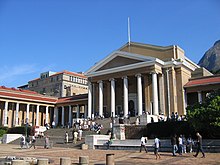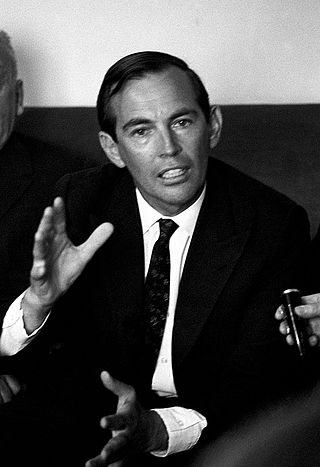
Christiaan Neethling Barnard was a South African cardiac surgeon who performed the world's first human-to-human heart transplant operation. On 3 December 1967, Barnard transplanted the heart of accident victim Denise Darvall into the chest of 54-year-old Louis Washkansky who regained full consciousness and was able to talk easily with his wife, before dying eighteen days later of pneumonia, largely brought on by the anti-rejection drugs that suppressed his immune system. Barnard had told Mr. and Mrs. Washkansky that the operation had an 80% chance of success, an assessment which has been criticised as misleading. Barnard's second transplant patient, Philip Blaiberg, whose operation was performed at the beginning of 1968, returned home from the hospital and lived for a year and a half.

The University of Cape Town (UCT) is a public research university in Cape Town, South Africa. Established in 1829 as the South African College, it was granted full university status in 1918, making it the oldest university in South Africa and the oldest university in Sub-Saharan Africa in continuous operation.
Louis Joshua Washkansky was a South African man who was the recipient of the world's first human-to-human heart transplant, and the first patient to regain consciousness following the operation. Washkansky lived for 18 days and was able to speak with his wife and reporters.
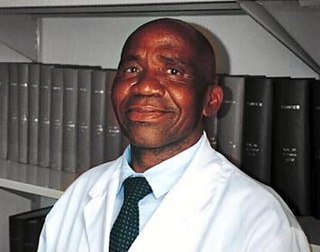
Hamilton Naki was a laboratory assistant to cardiac surgeon Christiaan Barnard in South Africa. He was recognised for his surgical skills and for his ability to teach medical students and physicians such skills despite not having received a formal medical education, and took a leading role in organ transplant research on animals.

Observatory is a suburb in Cape Town, South Africa, colloquially known as Obs. Bordered by Mowbray to the south and Salt River to the northwest, the area is best known as a student neighbourhood associated with the nearby University of Cape Town and Groote Schuur Hospital. It takes its name from the South African Astronomical Observatory headquarters, built in 1829 by the Royal Observatory.
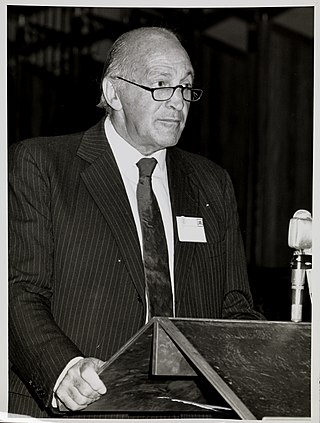
Sir Raymond Hoffenberg KBE GCOB was an endocrinologist who specialised in the study of the thyroid. Born in South Africa, he was forced to leave in 1968, and settled in the United Kingdom, where he was President of the Royal College of Physicians from 1983 to 1989, and President of Wolfson College, Oxford, from 1985 to 1993.

The Faculty of Dentistry at the University of the Western Cape (UWC) is the largest dental school in Africa. Located in Belville, near Cape Town the UWC Faculty of Dentistry offers the BChD (DDS) Degree, degree in dental hygiene, and post-graduate MChD, MSc(Dent) degrees.
Adrian Kantrowitz was an American cardiac surgeon whose team performed the world's second heart transplant attempt at Maimonides Medical Center in Brooklyn, New York on December 6, 1967. The infant lived for only six hours. At a press conference afterwards, Kantrowitz emphasized that he considered the operation to have been a failure.
Johan Naude is a South African surgeon and urologist. Naude was former president of the South African Urological Association and a pioneering transplant surgeon who worked closely with legendary heart transplant surgeon Christiaan Barnard.
The Western Cape Department of Health is a department of the Government of the Western Cape, responsible for providing public healthcare to the population of the Western Cape province of South Africa.

The Somerset Hospital in the Green Point area of Cape Town, South Africa opened in 1864 and has been declared a provincial heritage site.
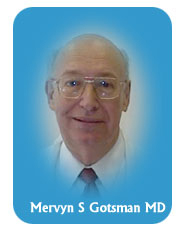
Mervyn S. Gotsman is Professor Emeritus of Cardiology at the Hebrew University of Jerusalem and Hadassah Medical Center in Jerusalem, Israel.
The Cape Medical Museum is situated in the Old City Hospital Complex in Green Point, Cape Town, South Africa. Its exhibitions center around the medical history of the Cape and includes exhibitions on dentistry, hospital care, traditional African medicine and pharmaceutical developments. It was founded by a group of volunteers in the 1980s led by Prof J C De Villiers. Since its conception it was proclaimed as a Provincial Museum of the government of the Western Cape province.

The Heart of Cape Town Museum is a museum complex in the Observatory suburb of Cape Town, South Africa. It is in the Groote Schuur Hospital on Main Road. The hospital was founded in 1938 and is famous for being the institution where the first human heart transplant took place, conducted by University of Cape Town-educated surgeon Christiaan Barnard on the patient Louis Washkansky. The museum opened on December 3, 2007, marking the 40th anniversary of the heart transplant by Christiaan Barnard. The Heart of Cape Town Museum honors everyone who played a major role in a surgical feat that created a new medical era. It also brings attention to ethical and moral implications that came up at the time. It also highlights the ways in which Barnard's accomplishment put South Africa and the University of Cape Town on an international stage.
Frances Rix Ames was a South African neurologist, psychiatrist, and human rights activist, best known for leading the medical ethics inquiry into the death of anti-apartheid activist Steve Biko, who died from medical neglect after being tortured in police custody. When the South African Medical and Dental Council (SAMDC) declined to discipline the chief district surgeon and his assistant who treated Biko, Ames and a group of five academics and physicians raised funds and fought an eight-year legal battle against the medical establishment. Ames risked her personal safety and academic career in her pursuit of justice, taking the dispute to the South African Supreme Court, where she eventually won the case in 1985.
Bongani Mawethu Mayosi BMedSci, MB ChB, FCP(SA), DPhil, was a South African professor of cardiology He was the Dean of the Faculty of Health Sciences at the University of Cape Town and an A-rated National Research Foundation researcher. Prior to this, he was head of the Department of Medicine at the University of Cape Town and Groote Schuur Hospital. his research interests included rheumatic fever, tuberculous pericarditis and cardiomyopathy. He was a member of the Academy of Science of South Africa and a former President of the College of Physicians of South Africa and he headed numerous other biomedical organisations during his career.
Elmi Muller is a South African medical specialist who specialised in General Surgery and Transplantation. She currently performs kidney as well as liver transplants in both adults and children. She is the past President of the Southern African Transplantation Society who pioneered an organ transplant programme at Groote Schuur Hospital in Cape Town for HIV positive patients using HIV positive donors. She also serves on the Executive committee of The Transplantation Society of which she currently is the vice-president. Elmi was the Chair/Head of the Division of General Surgery at Groote Schuur Hospital, University of Cape Town. She currently serves as Dean: Faculty of Medicine and Health Sciences at Stellenbosch University.
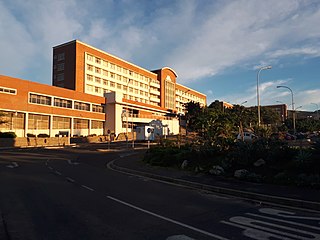
Karl Bremer Hospital is a hospital, situated in Bellville, Western Cape, South Africa. It was opened in 1956 with one ward. It was originally an academic hospital for medical students of Stellenbosch University and was utilised for this purpose until 1976, after which it changed to a hospital catering for private patients.

The following outline is provided as an overview of and topical guide to Cape Town:
Golda Selzer (1910–1999) was an academic and pathologist at Groote Schuur Hospital, and co-founder of SHAWCO. Selzer published extensively with over 50 articles of which more than 15 were on poliomyelitis.













